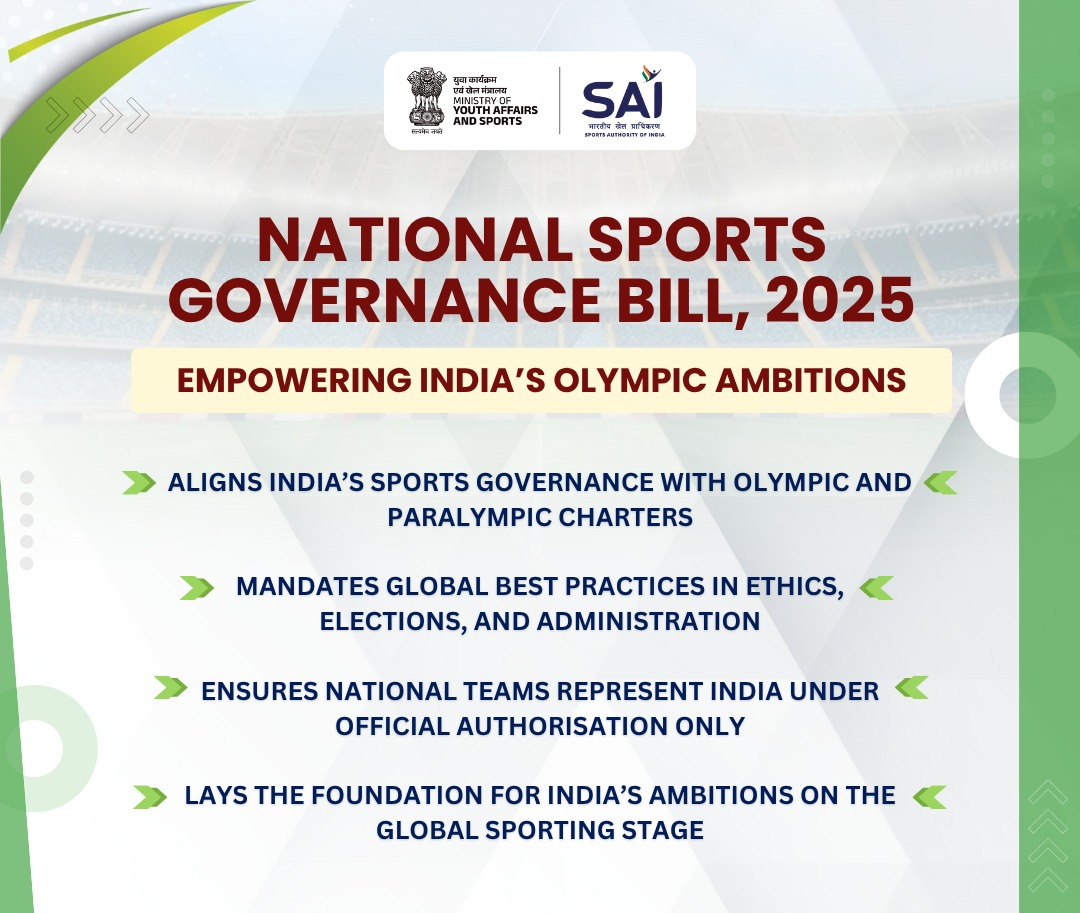National Sports Governance Bill 2025

- 26 Jul 2025
In News:
The National Sports Governance Bill, 2025, introduced in the Lok Sabha, marks a significant legislative effort to restructure and reform India's sports administration framework. It seeks to replace the non-binding National Sports Code of 2011 with a statutory, enforceable law that prioritizes transparency, athlete welfare, and institutional accountability.
Key Objectives of the Bill
- Establish a uniform governance system across all sports federations.
- Legally regulate bodies like the Board of Control for Cricket in India (BCCI).
- Align Indian sports governance with international standards, particularly ahead of India’s 2036 Olympic bid.
- Introduce dedicated institutions for oversight, dispute resolution, and electoral transparency.
Major Structural Changes
1. Statutory Institutions Established
|
Institution |
Function |
|
National Sports Board (NSB) |
Recognition, funding eligibility, ethics compliance, and oversight of NSFs. |
|
National Sports Tribunal |
Dispute resolution (e.g., selection, elections, governance conflicts). |
|
National Sports Election Panel |
Ensures free, fair, and independent elections of sports bodies. |
Governance Reforms in National Sports Bodies
- Recognition & Regulation: All National Sports Federations (NSFs), including the BCCI, must seek annual recognition from the NSB.
- Affiliation: National bodies must have aligned state and district units, and comply with international federations' statutes.
- Code of Ethics: Mandatory for members, athletes, coaches, sponsors, and officials.
- Grievance Redressal: Internal mechanisms must be instituted by each federation.
Administrative Structure of National Bodies
- General Body: Equal representation from all affiliates and ex-officio members.
- Executive Committee: Maximum 15 members, mandatory inclusion of at least 4 women and 2 elite athletes.
- Age Limit: Officials must be aged 25–70 years (exceptions up to 75 years if permitted by international rules).
- Term Limit: Max three consecutive terms of four years in the same or different posts, with a cooling-off period.
Role of the National Sports Board (NSB)
The NSB acts as a central regulatory authority, similar to SEBI in financial markets.
Powers and Functions:
- Granting/suspending/canceling recognition of sports bodies.
- Investigating misuse of funds or violation of athlete welfare norms.
- Issuing guidelines for ethics, governance, and international compliance.
- Forming ad-hoc bodies in case of international de-recognition.
Composition: Chairperson and members with expertise in sports governance, law, and public administration. Appointed by the central government through a search-cum-selection committee.
National Sports Tribunal
A quasi-judicial body to resolve disputes involving federations, athletes, and administration.
Composition:
- Chairperson: Sitting/former Supreme Court Judge or Chief Justice of a High Court.
- Two expert members from sports, law, or public administration.
Appointed by: A committee comprising the Chief Justice of India (or nominee), the Law Secretary, and the Sports Secretary.
Appeals: Lie directly to the Supreme Court, except where international regulations mandate the Court of Arbitration for Sport (CAS) in Switzerland.
Jurisdiction Excludes: Disputes related to international sports events and internal matters of global sports bodies.
Electoral Oversight
A National Sports Election Panel will be constituted, comprising:
- Former Election Commissioners of India
- Former Chief Electoral Officers and Deputy Election Commissioners
Purpose:
- Supervise elections of executive committees of national federations.
- Ensure electoral integrity at the state and district levels via affiliate panels.
Legal Enforceability vs. Sports Code 2011
|
Parameter |
Sports Code 2011 |
Governance Bill 2025 |
|
Legal Status |
Advisory guidelines |
Statutory law |
|
Enforceability |
Non-binding |
Legally enforceable |
|
Gender/Athlete Representation |
Not mandated |
4 women & 2 elite athletes required |
|
Dispute Resolution |
Ministry-driven |
National Sports Tribunal |
|
BCCI Regulation |
Outside purview |
Brought under framework |
|
Election Oversight |
Ministry oversight |
Independent election panel |
|
RTI Applicability |
Exempt (BCCI) |
Mandatory for recognized bodies |
Bringing BCCI Under the Legal Framework
Historically resisting regulation, the BCCI will now be required to:
- Register annually with the NSB.
- Submit to the National Sports Tribunal for disputes.
- Comply with RTI Act provisions, if it seeks government recognition and funding.
This change is significant as cricket is now part of the 2028 Los Angeles Olympics, making BCCI subject to international governance norms under the Olympic Charter.
Provision for Exemptions
The central government may exempt specific sports bodies from certain provisions of the Bill, in the public interest or for the promotion of specific sports disciplines.
Parallel Legislation: Anti-Doping Amendment
The National Anti-Doping (Amendment) Bill, 2025 was also introduced, addressing World Anti-Doping Agency (WADA) concerns. It:
- Retains the National Board for Anti-Doping, but strips it of oversight over NADA.
- Restores NADA’s independence, aligning Indian anti-doping efforts with international norms.
